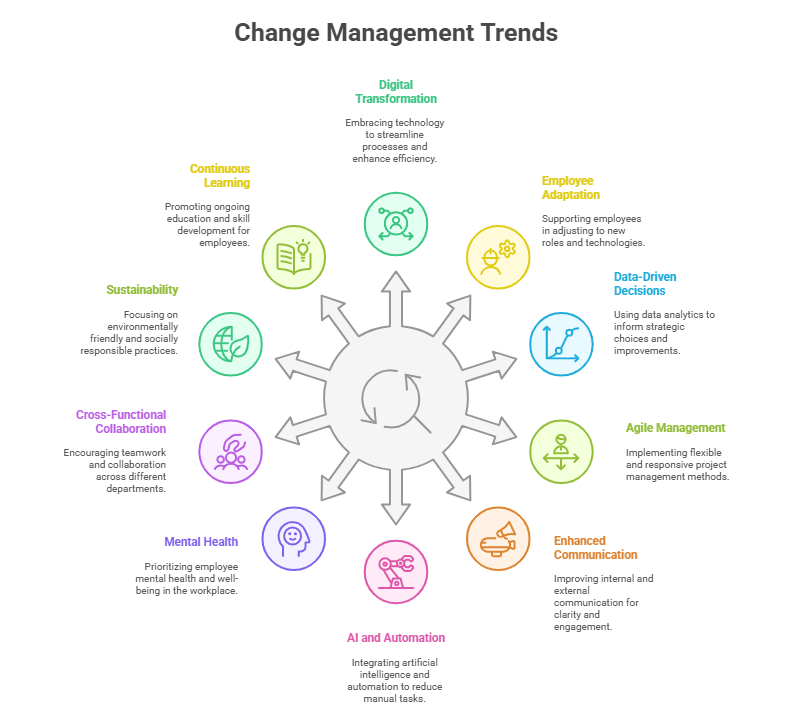Change management is the process of filling the gap between the organization’s current standard and its future outlook. Steps must be taken to adapt to changing market dynamics, including customer expectations and technology. Change management trends offer project managers great opportunities to expand their operations and gain long-term stability easily. The current volatility of the market makes it even more vital to adapt. This blog will explore the top 10 change management trends that every project manager must adhere to in order to enhance their performance and transformation journey.
Top 10 Change Management Trends to Adopt

Adopting Digital Transformation:
Project managers can improve customer experience, optimize resource utilization, and decrease dynamic business risks. Any change management plan worth its salt would ascribe a significant role to digital transformation. With digital transformation, project managers can incorporate various instruments and technologies, such as cloud computing, artificial intelligence, and machine learning. Digital tools ensure that business operations become more efficient and effective while encouraging managers to prioritize innovation in their work.
Employee Change Adaptation:
A positive employee experience entails several things, including how easily one can adapt to changes to achieve positive outcomes. Employees must be significantly involved in successful change management efforts along with other stakeholders. Ensure that employees have ease during the adoption of this change so that it is easily adhered to and the chances of success are increased. Offer your team adequate facilities, training, and support to transform the organization and themselves. Project managers must also focus on providing ongoing support and review to the employees so they don’t feel stuck while implementing a change in the organization.
Related: Employee Management – A Key to Success
Data-Driven Decision-Making:
Data analytics has relatively transformed change management processes and enhanced accuracy. Various organizations are utilizing the benefits of big data and deriving valuable insights. All this valuable data is then used to create better change management strategies focused on the organization’s growth. Using data analysis in change management promotes effective decision-making and allows the management to understand the employees’ approach toward change. It also helps them measure the impact and predict the organization’s future after implementing the required change. All these things reduce the chances of mistakes and improve the result of change.
Agile Change Management:
Traditionally, agile change management has only been associated with software development. Still, nowadays, it is employed for multiple purposes, including managing changes. Agile change management is an iterative approach that enhances the organization’s flexibility and adaptability. It primarily concentrates on improving team collaboration so the organization can easily achieve multiple milestones without facing severe challenges and bottlenecks. Agile change management reduces the risk associated with bringing a significant change in the organization, including rigidity, lack of support, lack of planning, etc.
Related: What is Agile Project Management?
Enhanced Communication Strategies:
A transparent and effective communication channel is necessary to implement a change successfully. A communication channel that eliminates the chances of misunderstandings and focuses on timely follow-up promotes the success of any big or small change. To ensure that organizations follow an effective communication channel, management around the business world uses special communication tools and strategies. Technology adoption is a great way to keep up with this trend. Technology promotes timely and transparent communication that every project manager can use for effective change management.
Related: The Importance of Communication in Project Management
Integration of AI and Automation:
The current business world demands that project managers adopt automation and maintain competitiveness. To adopt automation and artificial intelligence in an organization, project managers can use tools and software such as Robotic Process Automation (RPA), Chatbots, etc, to automate various repetitive tasks. It will also help them reduce the management and scheduling burden on human resources. Project managers must utilize artificial intelligence to automate almost every business operation, which does not include thinking and strategizing. Adopting automation brings significant benefits to the organization. It reduces the burden on employees and saves their energy. This gives them the space to innovate and focus on more important things.
Mental Health and Well-being:
Unlike before, employees’ mental health and well-being are a significant change management trend that successful organizations follow. Bringing a change is problematic because it involves breaking down old habits and coming out of your comfort zone. It is challenging for the employees as they must learn new skills and adapt to the organization’s rising expectations to successfully adapt to a change. This increases the pressure on the employee and negatively affects their mental health. Every organization must contribute special efforts to nurture employees’ mental health. For their well-being, managers can offer them strong support, a review system, and address their queries on time.
Promoting Cross-Functional Collaboration:
Collaboration plays a huge role in the success of any change management plan. Collaboration between departments, functions, teams, and stakeholders is essential for optimizing the required change. By enhancing cross-functional collaboration, project managers can also derive great benefits like innovative perspectives, ideas, strategies, and enhanced creativity. It also creates a robust support system where every department and stakeholder understands each other’s requirements and promotes a positive environment. Implementing a change in such an organization becomes easy and far more effective.
Sustainability and Social Responsibility:
With the enhanced promotion of Corporate Social Responsibility (CSR), organizations mainly focus on sustainability and social responsibility while implementing change management strategies. It includes implementing changes that concern the environment and enhancing the organization’s ethical values. Focusing on such initiatives creates an excellent reputation and face value for the organization. It helps them stand out and gain the customers’ trust for an extended period. Sustainability and social responsibility have become essential to change management strategies as they promote the welfare of every stakeholder involved in business operations.
Continuous Learning and Development:
Every change management process is based on constant learning and development. Today, organizations utilize unique strategies and technologies to enhance employees’ learning and change experiences. Organizations offer practical training programs and interactive resources that help employees easily comprehend the root of the change and grow along with the organization. Offering a well-programmed learning and development opportunity helps the organization develop a flexible and adaptive workforce with progressive potential. Such a workforce is an excellent resource for the organization and contributes to its success.
How OnIndus Can Help in Change Management?

At OnIndus, we focus on supporting organizations in implementing an effective change management process with the support of unique strategies, tools, and technologies. Our change management consulting services include a robust support system with expert advice, technologies like OnIndus Relay and OnIndus Dashboard Kit, and an understanding of the utilization of data analytics. By implementing a well-facilitated change management program, OnIndus helps organizations smoothly transition, adhere to digital transformation easily, and succeed.
Related: What Do Project Management Consultants Do To Make Change Successful?
Conclusion
Organizations must embrace the changing dynamics of the market if they are to remain competitive and flourish in today’s dynamic market. Such major shifts include digitalization, robotics process automation, improving employee experience, and promoting multi-functional partnerships. By including these policies, companies can effectively undertake transformation and attain permanent development. When you think about it, that is where OnIndus comes in with its expertise and cutting-edge technology. This will ultimately help make this transition effortless and successful over a long period of time.
FAQs
Q: What is the future of change management?
Organizations mainly focus on enhancing the employee experience, adopting technology, and contributing to their social responsibilities. The future of change management lies within these factors.
Q: What are the five pillars of change management?
The five pillars that support an effective change management process for every organization include Leadership, Communication, Engagement, Training and Support, and Feedback.
Q: How to use AI in change management?
Artificial intelligence has great potential to enhance the effectiveness of change management programs. Project management can use data analytical tools and software, such as OnIndus dashboard kits and Relays, to comprehend the impact of their change and create effective strategies.

